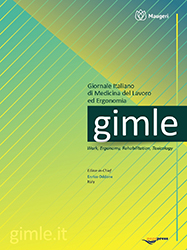NANOMATERIALS AND OCCUPATIONAL HEALTH: THE INAIL RESEARCH CONTRIBUTION FOR RESPONSIBLE INNOVATION AND RISK PREVENTION FOR WORKERS IN ITALY
All claims expressed in this article are solely those of the authors and do not necessarily represent those of their affiliated organizations, or those of the publisher, the editors and the reviewers. Any product that may be evaluated in this article or claim that may be made by its manufacturer is not guaranteed or endorsed by the publisher.
Authors
In the last years nanotechnologies and nanoproducts are constantly growing up thanks to their promising benefits for social and economic development. Nanomaterials are increasingly used in our daily life, finding application in many sectors such as textile, automotive, electronic, food, etc. In 2012, the European Commission included nanotechnologies among the Key Enabling Technologies (KETs), which provide the basis for innovation in the present century. In parallel to the growing interest at industrial and production level (estimated at about Il million of tons per year) the number of workers potentially exposed in all nanomaterials life cycle has increased. Concurrently, concerns about the potential effects on human health arose, attracting the attention by the scientific community, in particular on health and safety issues in workplaces.
In Italy the industrial market has evolved in the same direction with important economic investments both public and private. Consequently, numerous research groups belonging to the University, Institutions and Research Centers were involved in the study of the main issues to promote a responsible development of nanomaterials. In this framework, the main aim of this study is to highlight the commitment of Italian research in the field of health and safety of engineered nanomaterials, through the initiatives of Italian Workers Compensation Authority (INAIL) for sustainable development of nanotechnologies.
How to Cite

This work is licensed under a Creative Commons Attribution-NonCommercial 4.0 International License.
PAGEPress has chosen to apply the Creative Commons Attribution NonCommercial 4.0 International License (CC BY-NC 4.0) to all manuscripts to be published.






